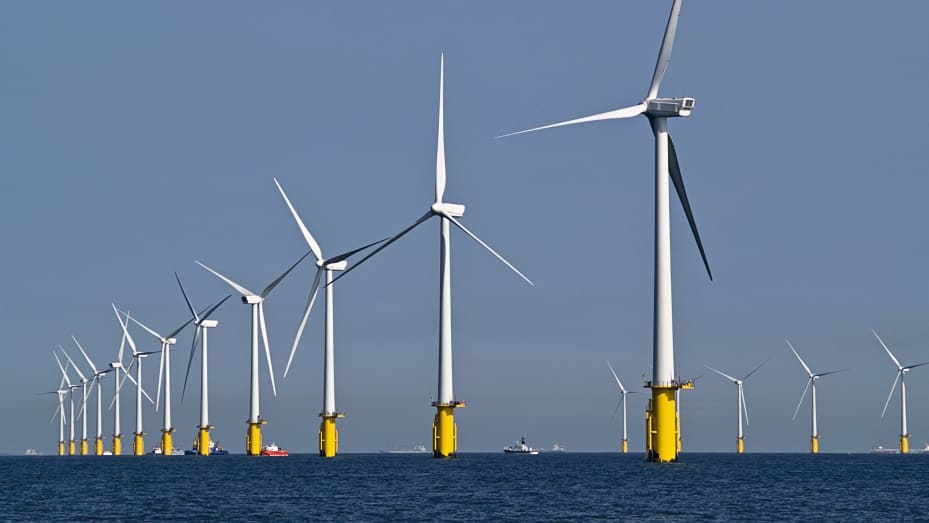The wind industry is ripping us off
News & Social Media / Post
Net Zero is making us all poorer

According to an FT report, renewable energy developers are facing delays of up to a decade to connect new capacity to the electricity grid, threatening the government’s pledge to shift away from fossil fuels and meet net zero targets.
The UK recently set out ambitious new goals to more than double existing renewable generation capacity, adding 50 gigawatts of offshore wind by 2030, 70GW of solar by 2035 and 24GW of nuclear by 2050. But developers say they are being told that they will have to wait six to 10 years to connect to the regional distribution networks because of constraints on National Grid’s network. The majority of large developers are now seeing construction-ready projects being delayed as a result of long queues and excessive charges to get access to the transmission system.
The issue of who pays for improvements to the electricity distribution network is crucial given that it’s privatised, with the National Grid providing the bulk of the central transmission network across Great Britain and supplying the six regional monopolies whose pylons, poles, wires and cables carry electricity to end users. How much they charge consumers are regulated via price controls set by watchdog Ofgem, which has been under pressure to get tough after being accused of allowing the companies to make excess profits.
The regional distributors earn their revenues from a surcharge on customer bills, with up to a fifth of the typical household energy bill — or roughly £371 a year — going towards the cost of the distribution network. National Grid says it has historically had 40-50 applications for connections a year but that this has risen to about 400 as renewables suppliers have proliferated.
The National Grid, said it was working with Ofgem and the industry to address the long queues, including by changing processes so that developers can no longer take network capacity before they have planning permission or have even started construction. The company is proposing to upgrade the network on a project-by-project basis, building bigger substations and more overhead lines but the industry is concerned over the cost of improvements to the network which are needed to shift from a system designed to serve large coal-powered plants close to urban centres to more dispersed renewables developments such as solar and wind farms.
Burdening smaller-scale projects with these transmission upgrade costs, which can be in the region of £12mn per substation, renders many projects unviable. It’s also a postcode lottery as to how much they are charged. If renewable energy developers do not pay the costs of upgrades they could be passed to consumers through bills or taxes.
This comes as no surprise. We noted back in March that there is an inherent conflict between the idea of diffuse, local generation and the national grid as currently constituted. It was set up to take a few, large generators from a limited number of locations, and distribute power nationally. Now it’s being asked to take small packages of power distributed over a vast range of sites, and still perform the function of ensuring equal distribution of power throughout the nation. This is something for which the grid was not designed to do, and to make it fit for purpose would require tens of billions of pounds.
This money is simply not available and, if it was factored in, it would be seen as part of the cost of renewables provision, pricing it out of the market. The Renewables sector is keen to ensure somebody else picks up the tab so as to continue claiming that renewable energy is “the cheapest source of energy”. But as we know, it isn’t. All other forms of energy have been taxed to make wind energy look competitive but in a free and fair market, nobody would be building windmills.
Worse still, The Times reports that Britons face paying tens of millions of pounds more than expected for electricity from offshore wind farms after developers used a contract loophole to cash in on the energy crisis. At least two newly constructed offshore wind farm projects have delayed activating their contracts to supply power to consumers at a fixed price, enabling them to sell it at higher prices in the market instead.
To encourage investment in offshore wind farms, the government awards developers contracts guaranteeing that consumers will pay a fixed price for every unit of electricity they generate. When the prices wind farms get in the market are below that level, consumers pay them subsidies; when market prices are above that level, the wind farms pay back to consumers.
The gas crisis has driven up the market price of electricity so that it is higher than the fixed price in most recent wind farm contracts. This is expected to result in wind farms under contract paying back hundreds of millions of pounds to consumers over the coming year. However, wind farm owners that are just completing construction are opting to delay the start date of their contracts so that they can avoid making these payments back to consumers.
It has long been the case that the industry has misled the consumer. In the days of the Renewables Obligation Certificates subsidy scheme they claimed that wind wasn’t subsidised, and lied to consumers by saying the installed capacity of wind farms is what they would produce in reality. If any other industry lied they way the wind lobby lies they’d be looking at lengthy court cases and massive fines.
Despite massive subsidies and a market heavily stacked in their favour, the wind industry still can’t make itself viable. Today’s Times has the wind industry calling for yet more cash help. Rising prices for steel and other materials have driven up the cost of wind turbines by a fifth in two years and risks increasing the cost of electricity from new projects, the industry has warned. Offshore wind power developers are calling on the government to raise the budget of an auction to support new projects this month otherwise it may not be feasible to invest in UK factories.
Many families are already at breaking point with current pressures on the household budget. The first obligation of any government is to bring energy costs under control. It’s ideological drive to decarbonise our electricity supply is incompatible with that aim. Wind energy is only adding to the overheads of energy supply while destabilising the national grid. Wind energy creates more problems than it solves and diverts much needed energy investment away from reliable, instantly dispatchable sources of power. The more the Tories double down on windmills, the longer we’ll be paying eyewatering prices for our energy. It has to stop.
Recent National News











